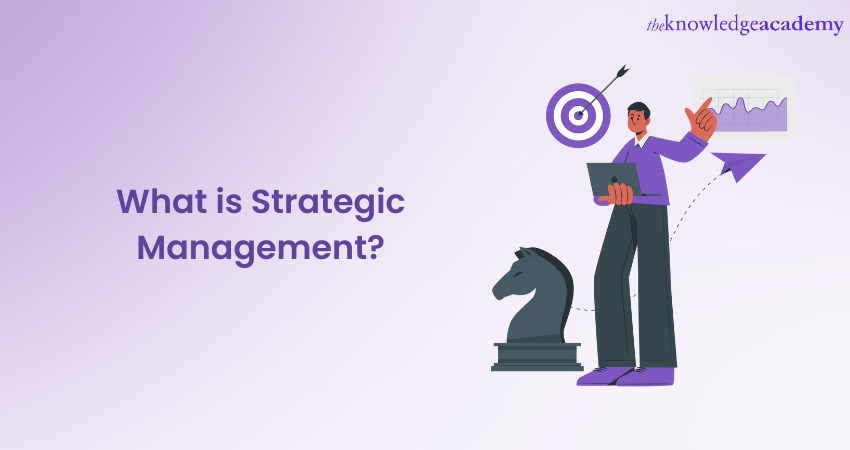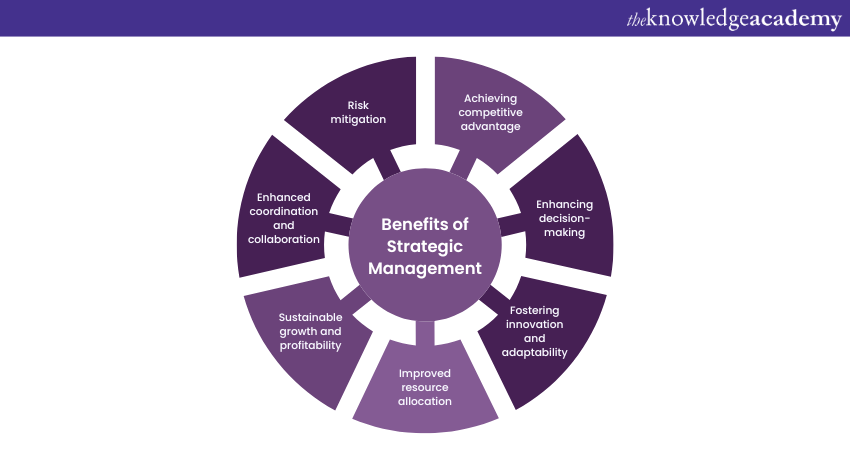We may not have the course you’re looking for. If you enquire or give us a call on 01344203999 and speak to our training experts, we may still be able to help with your training requirements.
Training Outcomes Within Your Budget!
We ensure quality, budget-alignment, and timely delivery by our expert instructors.

From pandemics to global economic shifts, businesses face numerous challenges and uncertainties everyday. In such a rapidly changing environment, Strategic Management plays a crucial role in guiding organisations towards resilience and success. It allows businesses to make informed decisions, anticipate disruptions, and adapt swiftly.
This comprehensive approach empowers companies to leverage opportunities, mitigate risks, and maintain a competitive edge. It ensures their survival and growth amidst the unpredictable currents of the business world.
If you want to implement this strategic approach in your organisation and drive it towards success, this blog is for you. In this blog, you will learn What is Strategic Management, its key elements, processes involved as well as its benefits. Let's dive in deeper to learn more!
Table of Contents
1) What is Strategic Management?
2) Key elements of Strategic Management
3) The five phases of Strategic Management
4) Types of Strategic Management strategies
5) Benefits of effective Strategic Management
6) Conclusion
What is Strategic Management?
Strategic Management is the continuous process of formulating, implementing, and evaluating Strategies to achieve organisational objectives. It involves setting clear goals, making informed decisions, and aligning resources to drive long-term success and competitive advantage. This process helps organisations identify their Strengths, Weaknesses, Opportunities, and Threats (SWOT) to formulate strategies that leverage their competitive advantage while mitigating risks.
It focuses on establishing a clear vision and mission for the organisation. This step is followed by the development of detailed Strategic plans to guide decision-making and resource allocation. These plans are then executed through various projects and initiatives, where the performance is monitored and measured against predefined objectives to ensure alignment with the overall strategy.
Importance of Strategic Management
Strategic Management is essential for businesses to navigate complexities and uncertainties. It provides a roadmap for achieving objectives and allows businesses to adapt to changing market conditions proactively. It plays an important role in the success and sustainability of an organisation by providing a clear roadmap to achieve its long-term objectives.
It enables organisations to anticipate, prepare for, and respond quickly to various changes in the external environment, including market trends, economic shifts, and competitive pressures. Through the systematic analysis of internal and external environments, Strategic Management helps in identifying opportunities for growth and areas of potential risk.
Level up your Leadership journey with our Management Training For New Managers. Sign up today!
The five Phases of Strategic Management
Strategic Management unfolds through five essential phases, each critical for the successful navigation and implementation of an organisation's Strategic plan. These five stages are as follows:
a) Goal setting: This phase involves clarifying the vision and mission of the organisation. It sets the stage for Strategic planning by establishing clear, long-term objectives that reflect the organisation’s purpose and direction. This phase ensures that all members understand the organisation's goals and their role in achieving them.
b) Analysis: This phase consists of a thorough examination of both the internal and external environments. Internally, it assesses the organisation’s strengths and weaknesses. Externally, it evaluates opportunities and threats present in the marketplace or industry, often through tools like SWOT (Strengths, Weaknesses, Opportunities, Threats) or PESTEL (Political, Economic, Social, Technological, Environmental, Legal) analyses. This comprehensive analysis provides the necessary insights for informed Strategic decision-making.
c) Strategy formulation: This phase is based on the various insights gained from the analysis. It involves developing specific strategies to achieve the organisation's objectives. It requires choosing among different options and creating a plan that leverages strengths, addresses weaknesses, capitalises on opportunities, and mitigates threats.
d) Strategy implementation: This phase focuses on executing the formulated strategies. It involves allocating resources, organising teams, establishing timelines, and initiating actions which are necessary to achieve the Strategic objectives. Effective implementation requires coordination across all levels of the organisation and clear communication of responsibilities and expectations.
e) Evaluation and control: The final phase involves monitoring outcomes and assessing the effectiveness of the Strategic plan against the set objectives. This continuous evaluation process allows for the identification of any deviations from the plan and the implementation of corrective actions. It ensures the organisation remains aligned with its Strategic goals and can adapt to any changes in the internal or external environment.
Types of Strategic Management strategies
There are different types of Strategic Management strategies. These types are as follows:
a) Cost leadership: This strategy aims to become the lowest-cost producer in the industry, thereby allowing the company to undercut competitors or achieve higher profitability.
b) Differentiation: This strategy focuses on offering unique products or services that stand out in the market, allowing the company to charge premium prices.
c) Focus: This strategy narrows the company's target market, concentrating on a specific geographic area, product line, or market segment to serve a well-defined customer group more effectively than competitors who target the broader market.
Benefits of effective Strategic Management
Embracing a well-executed strategic approach offers numerous benefits that contribute to the overall performance and competitiveness of the company. Let's explore some of the key advantages:

1) Achieving competitive advantage: Strategic Management enables businesses to identify their strengths and leverage them to gain a competitive edge over rivals. By aligning resources and capabilities with market opportunities, organisations can position themselves as industry leaders, differentiating themselves from competitors.
2) Enhancing decision-making: A Strategic approach involves thorough analysis and data-driven decision-making. By considering both internal and external factors, leaders can make informed choices that maximise outcomes while minimising risks. This ensures that decisions are not based on intuition but are backed by evidence and strategic alignment.
3) Fostering innovation and adaptability: An effective Strategic Management process encourages innovation throughout the organisation. By nurturing a culture of creativity and experimentation, businesses can adapt quickly to market changes, technological advancements, and customer demands, staying ahead in a rapidly evolving landscape.
4) Improving resource allocation: Strategic Management optimises the allocation of resources, both financial and human. By aligning resources with strategic priorities, organisations avoid wasteful spending and focus on initiatives that contribute most significantly to their long-term goals.
5) Sustainable growth and profitability: Organisations that embrace effective Strategic Management are better positioned for sustainable growth and profitability. By continuously evaluating and adjusting Strategies, businesses can respond to changes, seise opportunities, and mitigate risks, ensuring their long-term success.
6) Enhancing coordination and collaboration: Strategic Management promotes effective coordination and teamwork among different departments and teams. This promotes cross-functional synergy, enabling organisations to tackle complex challenges and capitalise on collective knowledge and expertise.
7) Risk mitigation: Strategic Management involves risk assessment and contingency planning. By finding potential risks and developing risk mitigation Strategies, businesses can navigate uncertainties more effectively, safeguarding their operations and minimising the impact of adverse events.
Conclusion
We hope that from this blog you have understood everything that we discussed about Strategic Management. It is indispensable in navigating the challenges and uncertainties that businesses face today. It empowers organisations to adapt, make informed decisions, and pursue long-term goals for sustainable success.
Unlock your managerial potential and lead with confidence with our Management Training Courses. Sign up today!
Frequently Asked Questions

Strategic Management is an excellent career for those passionate about shaping the direction of businesses and organisations. It offers the opportunity to make significant impacts on an organisation's success, provides exposure to various industries and functions, and demands creative thinking, problem-solving, and decision-making skills, leading to high satisfaction and competitive compensation.

Important terms in Strategic Management include vision, mission, goals, objectives, SWOT analysis (Strengths, Weaknesses, Opportunities, Threats), competitive advantage, Strategic planning, Strategic implementation, Strategic control, corporate strategy, business unit strategy, functional strategy, stakeholder analysis, and value chain analysis.

The Knowledge Academy enhances global learning with a vast selection of over 30,000 online courses, accessible in more than 490 locations across 220 countries. This expansive reach ensures accessibility and convenience for learners worldwide.
Our diverse Online Course Catalogue covers 17 essential categories, complemented by a wealth of free educational Online Resources. These resources include up-to-date News, informative Blogs, tutorial videos, interactive webinars, and collections of Interview Questions. Furthermore, professionals looking for personalised education can take advantage of TKA's customisable Course Bundles, crafted to enrich and optimise the learning journey.

The Knowledge Academy's Knowledge Pass, a flexible prepaid voucher system, offers the freedom to join in courses over a 12-month period. Start your limitless learning adventure with us and embrace education that knows no bounds.

Discover an array of Personal Development Courses at The Knowledge Academy, featuring specialised Organisational Skills, Emotional Intelligence Training, Time Management Training, etc. Designed for different skill levels, our courses provide the necessary technical expertise to learn What is Emotional Resilience.
Whether you're starting out or looking to upgrade your Skills, immerse yourself in our Business Skills Blog for further understanding and expertise. Embark on a journey with us to elevate your Personal Development Skills!
Upcoming Business Skills Resources Batches & Dates
Date
 Introduction to Management
Introduction to Management
Fri 24th May 2024
Fri 21st Jun 2024
Fri 19th Jul 2024
Fri 23rd Aug 2024
Fri 20th Sep 2024
Fri 18th Oct 2024
Fri 22nd Nov 2024
Fri 20th Dec 2024







 Top Rated Course
Top Rated Course



 If you wish to make any changes to your course, please
If you wish to make any changes to your course, please


